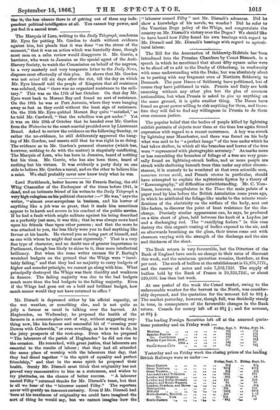The Marquis Of Lorn, writing to the Daily Telegtaph,' conderiins
Mr. Eyre forl putting Mr. Gordon to death without evidence against him, but pleads' that it 'was 'done "on the stress of the :moment," that it was an action which was hurriedly done, though most men on a calm review would disapprove it. Mr. Gorrie, a barrister, who went to Jamaica as the special agent of the Anti- slavery Society, to watch the Commission on behalf of the negroes, in a very masterly and very temperate letter to the Daily News, disposes most effectually of this plea. He shows that Mr. Gordon was not seized till six days after the riot, till the day on which Mr. Eyre himself told the people of Kingston that all resistance was subdued, that "there was no organized resistance to the mili- tary." This was on the 17th of last October. On that day Mr. Eyre went back to Morant Bay and found no sort of resistance. On the 18th he was at Port Antonio, where they were hanging away as fast as they could without the least sign of resistance. On the 20th Mr. Eyre quitted Morant Bay quite "satisfied," as he told Mr. Cardwell, "that the rebellion was got under." Yet it was on this 20th of October that he handed over Mr. Gordon from the Wolverine to the court-martial presided over by Lieutenant Brand. Asked to review the evidence on the following Sunday, or rather the no-evidence, he still deliberately approved the hang- ing of Mr: Gordon, and asserts still that he was right in so doing. The evidence as' to Mr. Gordon's personal character (which has, -however nothing to do with the matter) is singularly conflicting, -The Ma;cpais of Lora, who has been in Jamaica, heard of nothing but his vices. Mr. Gorrie, who has also been there, heard of nothing but his virtues. It was evidently a party duty on one side to believe Mr. Gordon a rascal, and on the other to believe him a saint. We shall probably never now -knovr truly what he was.






























 Previous page
Previous page